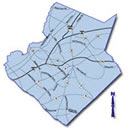Criminal Procedures for Citizens - Forms
Appointed Counsel & Affidavit of Financial Resources (MAG 20-03)
Purpose of form:
This form is filled out by a criminal defendant (that is someone who has been charged with a criminal offense) requesting the appointment of an attorney to represent him/her on the criminal charge. The Magistrate Court can not appoint an attorney to represent a party in a civil case. Every criminal defendant has the right to represented by an attorney. The Court appoints an attorney to represent a criminal defendant if it is determined by the Court that a Defendant can not afford to retain (pay for) their own attorney.
This application is in the form of an affidavit which is a sworn statement. given under oath. The applicant is swearing under oath that all the information contained in the application is true.
A defendant may apply for the appointment of an attorney if they have been served with a notice of a warrant application hearing prior to or at the hearing in the Magistrate Court.
A defendant may apply for the appointment of an attorney if they have been arrested on a criminal warrant. If arrested on a warrant, the Defendant may make the request in the Magistrate Court while incarcerated or after bonding out up until the time they have gone before a State or Superior Court Judge. Once a defendant goes before a State or Superior Court Judge any request for appointed counsel must be made to that Judge.
Other:
If an attorney is appointed by the Court, and it is later determined by the Court that the Defendant is able to reimburse the County for the cost of the attorney, the Defendant may be required to reimburse the County for the costs of his/her attorney.
 |
Appointed Counsel & Affidavit of Financial Resources [DOC] |
Instructions for Citizen Arrest Warrants (MAG 20-39)
Provides citizens applying for arrest warrants basic information on how to initiate the criminal arrest warrant process.
 |
Instructions for Citizen Arrest Warrants |
Civilian Criminal Arrest Warrant Application
Civilian Warrant Hearing (MAG 20-04)
Purpose of form:
This form is filled out by the Judge to set up a hearing for a criminal arrest warrant application. When a civilian makes a written application for the issuance of a criminal arrest warrant, a Judge makes a determination as to whether the application should be set down for a hearing. If the Judge determines that the application should be set down for a hearing, this form is filled out stating the crime alleged and setting down the time, date, and location of the hearing. The Judge delivers one copy to the applicant at the time of the application. The Clerk of Court mails one copy to the defendant at the address provided by the applicant.
Other:
O.C.G.A. 17-4-40. (b) (1) If application is made for a warrant by a person other than a peace officer or law enforcement officer and the application alleges the commission of an offense against the penal laws, the judge or other officer shall schedule a warrant application hearing as provided in this subsection.
O.C.G.A. 17-4-40. (b) (4) At the warrant application hearing, the rules regarding admission of evidence at a commitment hearing shall apply. The person seeking the warrant shall have the customary rights of presentation of evidence and cross-examination of witnesses. The person whose arrest is sought may cross-examine the person or persons applying for the warrant and any other witnesses testifying in support of the application at the hearing. The person whose arrest is sought may present evidence that probable cause does not exist for his or her arrest. The judge ... shall have the right to limit the presentation of evidence and the cross-examination of witnesses to the issue of probable cause.
O.C.G.A. 17-4-40. (b) (5) At the warrant application hearing , a determination shall be made whether or not probable cause exists for the issuance of a warrant for the arrest of the person whose arrest is sought. If the judge ... finds that probable cause exists, the warrant my issue instanter.
 |
Civilian Warrant Hearing [DOC] |
Address Verification Civilian Warrant Hearings (MAG 20-20V)
This form helps the court determine whether or not sufficient information has been given the court to comply with the essential due process duties of giving notice of a future warrant application hearing to the accused.
 |
Address Verification Civilian Warrant Hearings [DOC] |
Application Appointed Counsel Spanish (MAG 20-14)
Purpose of form:
This form is in spanish.
This form is filled out by a criminal defendant (that is someone who has been charged with a criminal offense) requesting the appointment of an attorney to represent him/her on the criminal charge. The Magistrate Court can not appoint an attorney to represent a party in a civil case. Every criminal defendant has the right to represented by an attorney. The Court appoints an attorney to represent a criminal defendant if it is determined by the Court that a Defendant can not afford to retain (pay for) their own attorney.
This application is in the form of an affidavit which is a sworn statement given under oath. The applicant is swearing under oath that all the information contained in the application is true.
A defendant may apply for the appointment of an attorney if they have been served with a notice of a warrant application hearing prior to or at the hearing in the Magistrate Court.
A defendant may apply for the appointment of an attorney if they have been arrested on a criminal warrant. If arrested on a warrant, the Defendant may make the request in the Magistrate Court while incarcerated or after bonding out up until the time they have gone before a State or Superior Court Judge. Once a defendant goes before a State or Superior Court Judge any request for appointed counsel must be made to that Judge.
Other:
If an attorney is appointed by the Court, and it is later determined by the Court that the Defendant is able to reimburse the County for the cost of the attorney, the Defendant may be required to reimburse the County for the costs of his/her attorney.
 |
Application Appointed Counsel Spanish [DOC] |
Special Conditions of Bond (MAG 20-19)
Purpose of form:
This form is filled out by the judge and imposes conditions on the bond with any criminal warrant where the judge determines that conditions on the defendant's bond are necessary to protect the named victim of a crime. In a criminal case involving domestic violence the judge is required when a bond can be set to place special conditions on said bond.
Other:
O.C.G.A. 17-6-1. (f) (2) For offenses involving an act of family violence, as defined in Code Section 19-13-1, the schedule of bails ... shall include, but not be limited to, having no contact of any kind or character with the victim or any member of the victim's family or household, not physically abusing or threatening to physically abuse the victim, the immediate enrollment in and participation in domestic violence counseling, substance abuse therapy, or other therapeutic requirements.
 |
Special Conditions of Bond [DOC] |
CD Audio Tape Request (MAG 20-23)
Purpose of form:
This form is filled out by an individual seeking an audio tape/CD copy of a commitment, first appearance hearing or a warrant application hearing. The form is given to clerk in the criminal division of the magistrate court. The cost of the audio tape/CD copy is $5.00.
The CD operates on a computer system, not on a traditional CD player. To play the audio from the CD, please follow these instructions:
- Go to the website, http://www.bisdigital.com
- In the center of the page, click the red button.
- Click on the link at the bottom of the screen to download the DCR Software.
- After installing the software, insert the CD into your CD drive. A courtroom file will be displayed.
- Double-click on the file. A player will be displayed.
- Press the arrow on the far left, and the CD will begin to play.
 |
CD Audio Tape Request [DOC] |
Victim ID (MAG 20-32)
Purpose of form:
This form is used to transmit victim identification information to the District Attorney's office for felony crime victims and to the Solicitor's Office for misdemeanor crime victims.
This data is required so that the respective prosecutor's offices can quickly and readily identify, contact and follow-up with crime victims as the course of the criminal justice process requires.
Also, crime victims now have vested rights. This form provides the necessary data to officials within the prosecuting attorney office to permit them to better coordinate communications with crime victims.
 |
Victim ID [DOC] |
Attorney Invoice Indigent Defense (MAG 20-60)
Expert Invoice Indigent Defense Cases (MAG 20-63)
Investigator Invoice Indigent Defense Cases (MAG 20-64)
Media Requests for Access to Court Proceedings (MAG 25-25)
Pursuant to Rule 11, Uniform Rules of Magistrate Courts, media personnel, or others, desiring to bring a camera, video or audio recording device into a Magistrate Court proceeding are required to have prior court permission. The form, MAG 25-25, should be completed and submitted to the office of the Chief Magistrate prior to the start of court proceedings. If the Chief Magistrate is not available, the written request can be made to any magistrate judge, preferably the magistrate judge conducting the hearing.
The form, MAG 25-25, can be submitted to the Chief Magistrate or other presiding magistrate at the Gwinnett Justice & Administration Center. Alternatively, you can FAX your request to the office of the Chief Magistrate at 770-822-8075. Please submit your written request as early as possible.
You will be required to present the written approval of form MAG 25-25, signed by the Chief Magistrate or other judge of this court, to court security. Therefore, you should make certain you begin your written request procedure well in advance of the court date and time to insure that your request will have time for routine processing and a return of the form to you.
 |
Media Requests for Access to Court Proceedings [DOC] |





